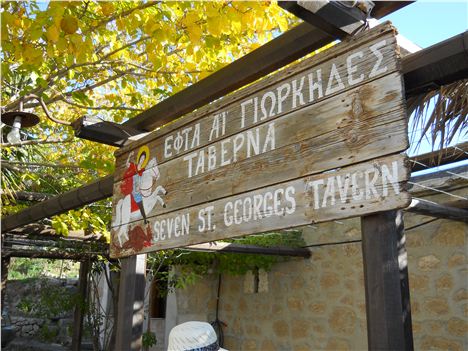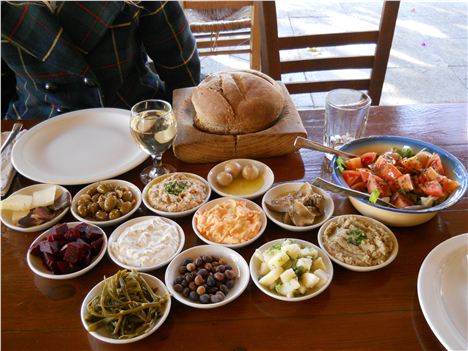THE cockerel’s insistent crow beckons us to breakfast as the church bells toll in the village of Kalopanayiotis, in the heart of Cyprus.
The welcome is hearty. From our medieval stone and timber lodgings we trip along the steep and narrow cobbled pathway to the parlour to feast on organic goodies: mushrooms, haloumi hard cheese and soft goat’s cheese, bitter orange and lemon jams on crusty bread served on local pottery.
Housekeeper Mrs Andigoni Charalambous pours endless cups of syrupy thick coffee at the Casale Panayiotis guesthouse, a restored traditional building listed by Cyprus Agrotourism Company (www.agrotourism.com.cy), who offer off-the-beaten track accommodation across the island.
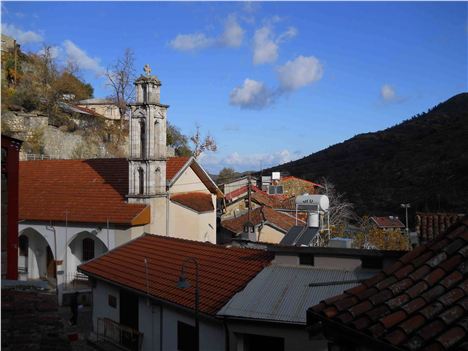 Rooftops of Kalopanayiotis village
Rooftops of Kalopanayiotis village
The pace of life has slowed. We are a million miles from the frenetic resorts of Pafos, Limassol and Ayia Napa down on the coast. We breathe clear Troodos Mountain air in pale December sunshine.
We explore a stylish spa cunningly housed in what was an ancient grapes press and wine store, glinting with silver kapnistiri, vessels to hold rose water poured in welcome on visitors’ hands.
Welcome to a very different Cyprus. As the third largest island in the Mediterranean, she is better known as a magnet for over two million tourists bound for its sunny beaches and pulsating nightlife. Purpose-built resorts dominate coastal strips with their clubs, discos and bars rammed with holidaymakers who sample little of the genuine Cyprus.
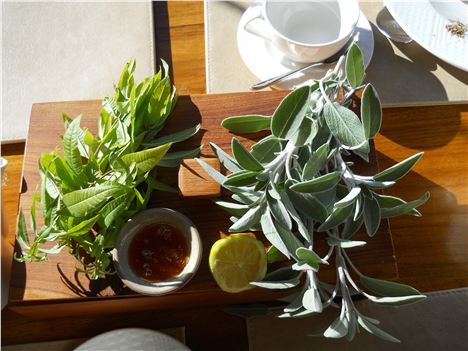 Home-grown herbs at the Ayiii Aanagyri Hotel and Spa Resort
Home-grown herbs at the Ayiii Aanagyri Hotel and Spa Resort
Dare to be different and you will discover a gentler pace of life, meet villagers who are proud to show off their heritage, hospitality and gastronomy. Gastronomy. Mmmm. =Meze. Wherever you go restaurateurs vie to outdo each other with the variety of their meze, wonderful mixtures of meat, fish, rice, breads and vegetables that will just keep on coming until you cry: Stop.
We shelter from a wild hailstorm sweeping the mountains to try the delights of the Two Flowers restaurant in Pedoulas: kleftico lamb cooked in a clay oven, moussaka, afelia (pork pieces cooked in red wine and coriander), stuffed vine leaves, courgettes in scrambled egg, deep fried squid rings, quince and bitter orange, apple cake, baklavas dripping with honey. At 1200 metres we probably consume 1200 calories before groaning our thanks.
Another exponent of Cyprus’s famous meze is George Demetriades, an island authority on gastronomy, meaning the law of the stomach in Greek. His Seven St George’s Tavern on the outskirts of Pafos attracts an international clientele.
“My life’s work has been getting tourists away from ‘package holiday fare’ to find the true meaning of gastronomy here in Cyprus,” says the extrovert George, splashing wine into glasses with a flourish. “I don’t serve fast food _ only meze, which is culture not just food. You eat, you drink and relax and you talk. George certainly talks. The hind legs off a Greek donkey His meze, complete with sautéed snails in garlic he has personally foraged, is served on a sun-dappled terrace where tables are laden with a seemingly endless stream of dishes that flows from kitchen to diner.
“I make 1,000 litres of olive oil a year, my own bread, my own wine, chutney and have been growing vegetables since I was a child. This is my life. I love it. It’s my passion,” says the foodie, who is as expansive as his waistline.
Time to watch mine and take advice from museum curator Thaofanis Pilavakis, 88, whose large clay pots, once used to store wine, are turned into saunas to restore the figures of newly-delivered mothers. A 40 day regime of wrapping the post childbirth tummy in tight bandages and enduring herb saunas guarantees a silhouette worthy of Aphrodite.
Well, it worked for Mr Pilavakis’ wife Xenia, who bore him his first child when they were teenagers. ‘We loved each other from 11 years old,’ he recalls fondly. ‘We married at 16 and had four children. She got her figure back after 40 days. She died at 60 and is buried where we first kissed.’
The huge wine jars are housed in his pottery museum, based in his family’s 400 year old house in the village of Foini. Mr Pilavakis, who worked as a tailor in London for three decades, is an entertaining character known all over the island and beyond.
Now rural areas and de-populated villages like Foini are blossoming once more thanks to a series of six routes which encourage holidaymakers to discover the true Cyprus, boosting the economy of areas which lost out to seaside destinations.
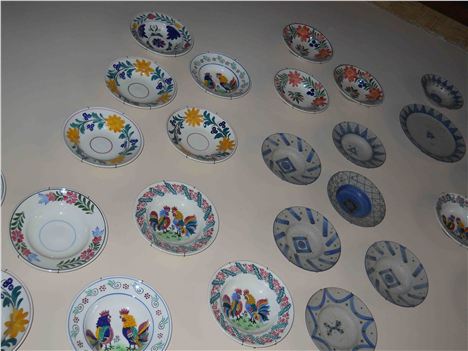 Pottery In The Parlour Of Casale Panayiotis
Pottery In The Parlour Of Casale Panayiotis
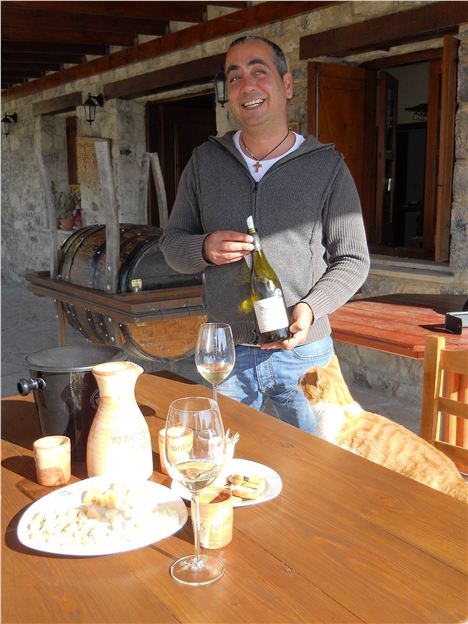 Wine – sampling the Cypriot heritage
Wine – sampling the Cypriot heritage
One route brings us to the Museum of Village Life in Steni (www.steni.org.cy), run by mayor Elias Lambides and his Polish-born wife Anastasia. They are both passionate about preserving the island’s traditions and culture.
Fearing that the old ways would be lost forever to future generations, they and other villagers have lovingly created a treasure trove of exhibits from rat traps to textiles, pitchforks to pots, bridal wear to weaving looms to reflect the past of an island once a neglected province of the Ottoman Empire handed over to Queen’s Victoria.
“We must bring the foreign visitors up here to these villages and in contact with the people. It is our richest resource, friendliness and willingness to share our history, traditions and hospitality,” says the mayor. ‘Yamas!’he cries as he toasts our visit with a tiny glass of legendary Cypriot firewater Zivania, poured from a crystal decanter.
And yamas again as the robust red wine flows with offers of soft goat’s cheese slathered in a rich carob sauce. This is Cypriot hospitality at its best.
A wine tour by car through the island’s major wine producing regions brings us to the tiny village of Lemona where Tsangarides Winery (www.tsangarideswinery.com) has been cultivating vines for generations and winning prizes for its fine wines. Can there we be a better way to pass an hour in winter sunshine than by sampling the organic crisp whites, fruity roses and round reds with slivers of salty cheese? Sadly they don’t export to the UK, so you will have to buy the bottled sunshine here
Now for some serious down time. Spa time. Taking the waters in five star splendour
We pass vineyards, citrus and olive groves to reach the picturesque village of Miliou, 10 minutes drive from Polis. Surrounded by orange groves is a stunning rural retreat, the Ayii Anargyri hotel and Spa resort,(www.aasparesort.com) fuses tradition, sustainability and all the modern comforts where guests take ‘the waters’ thanks to odorless sulphur water on tap in most bedroo
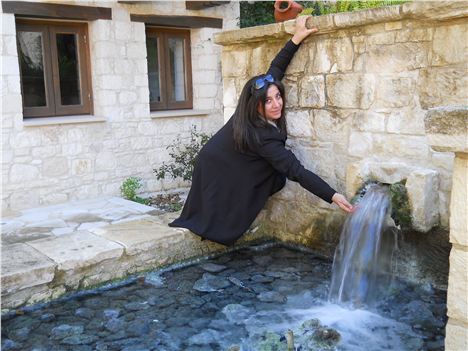 Ayiii Aanagyri Hotel and Spa Resort – the waters
Ayiii Aanagyri Hotel and Spa Resort – the waters
The waters come from springs discovered by two monks, both doctors, in the 17th century and it has been a centre of healing ever since. The hotel’s name means Without Silver because the monks gave healing treatments without asking for payment.
Eva Chrysanthou and her family own and run the 56 room hotel and Spring of Life spa with its complex of pools and jets and treatment rooms for body wraps, scrubs, mud and massage
Eva, also the village mayor, has a passion for nature and hospitality, proudly showing off her orange, lemon, mandarin and clementine trees, vegetable and herb gardens. “Everything you have eaten for breakfast has been grown and produced here. It’s all grown with sun, water and love,” she says.
Driving towards the Larnaka region, we discover another gem in the village of Kalavasos. Facing St Mary’s Tetiotissa Church on a quiet street a couple of 19th century buildings conceal an elegant hostelry, The Library Hotel (www.libraryhotelcyprus.com). The boutique hotel, the epitome of understated comfort and tranquility, is owned by philosopher and philanthropist Savvas Varnavides.
The 11 stylish rooms and suites are all named after poets and writers, with one devoted to Oscar Wilde. There is also a extensive library, original art works and a wellness centre based on ancient Greek bathing techniques and healing methods.
We have taken the road less traveled and this is the perfect final pitstop on a journey to discover the real Cyprus.
Fact file
For further information on sustainable and agro tourism on Cyprus see www.visitcyprus.com.The Casale Panayiotis guesthouse is a restored traditional building listed by Cyprus Agrotourism Company (www.agrotourism.com.cy), who offer off the beaten track accommodation all over the island.
Luxuriate in the rural retreat of Ayii Anargyri hotel and Spa resort,(www.aasparesort.com) where tradition, sustainability and all the modern comforts co-exist and guests take ‘the waters’ courtesy of sulphur water on tap in most bedrooms and sample pummeling water jets and more gentle treatments in the Spring of Life spa with its complex of pools.
The Library Hotel is a boutique hotel owned by a philosopher and philanthropist Savvas Varnavides. The stylish rooms and suites are all named after poets and writers, with one devoted to Oscar Wilde. There is also a extensive library as the name suggests and a wellness centre based on ancient Greek bathing techniques and healing methods (www.libraryhotelcyprus.com).
Flights from Manchester to Cyprus: www.easyjet.com
www.jet2.com
www.monarch.co.uk
www.flythomascook.com








